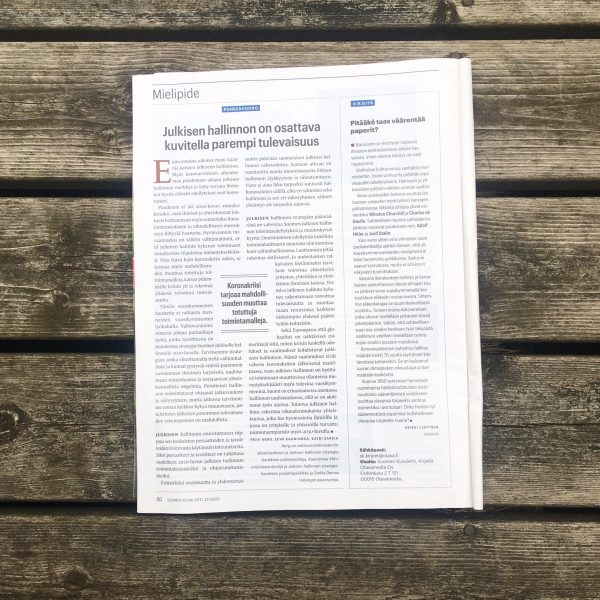In uncertain times, people turn their eyes towards central and local government. The importance of public governance and its role in securing the conditions in which people can lead good lives is highlighted especially now, during the COVID-19 pandemic. This article is originally published in the Finnish weekly magazine, Suomen Kuvalehti.
In the coming decade, we will be faced with other kinds of crises, too, such as climate change and economic challenges. To protect our welfare and wellbeing, it is therefore vital that public governance is able to function successfully under the changing circumstances and in transformational situations. However lamentable the coronavirus crisis is, it also offers the opportunity to change our habits and ways of operating, to look beyond this crisis and build the desired future together.
The challenges of the coming decades will not be solved using the tools of past decades. The Finnish Ministry of Finance is currently leading a project aimed at forming a public governance strategy for Finland in the 2020s. We need a strategy that points to a path along which central and local governments can reform their activities more effectively than before. If we follow traditional administrative and governance practices, they will lead to continuity and preservation; however, in the future, what we will need above all is an ability to change and transform, to allow the building of a better future after each crisis.
The challenges of the coming decades will not be solved using the tools of past decades.
The success of public governance depends on the practical and functional implementation of its essential principles and objectives, for which reason, they must be reinterpreted as new policy statements and steering mechanisms better suited for public governance in the 2020s. For example, transparency and equality are considered the strengths of Finnish public governance; yet, at the same time, the need for change exists as the implementation of these principles is hindered by bureaucratic rigidity and administrative silos, for instance, resulting in disrupted information flow between different branches of government as well as negatively affecting the cooperation between public governance, its sectors, and stakeholders .
The aim of the new strategy is to strengthen the operational and transformative capabilities of Finnish public governance: in order for its implementation to be successful, the operational culture in both local and central government needs to drastically change. Trust needs to be actively built, and in order to discover new solutions, the cooperation between companies, communities, and individuals needs to be fluent. Well-functioning public governance is able to build the desired future and direct its resources to all the most important, jointly decided goals.
In Europe and around the world, examples can be seen of how, in the midst of the crisis, people’s expectations and demands are focused on governments and the authorities. These demands will not diminish in the post-COVID-19 world; instead, government at all levels will have to be able to function successfully under the changing circumstances and in transformational situations in the decades ahead, too. When it comes to reforming governance, Finland is very well placed as it has begun work on this at an early stage. The main values, principles, and goals of public governance need to be reinterpreted effectively in the form of operating policies and guidance mechanisms for governance in the coming decades.
Authors:
Päivi Nerg, Permanent Under-Secretary, Ministry of Finance, chair of project on public governance strategy
Eeva Kaunismaa, Senior Specialist, Ministry of Finance, head of project on public governance strategy
Katri Sarkia, expert, Demos Helsinki

Article photo: Mike Bacos / Unsplash